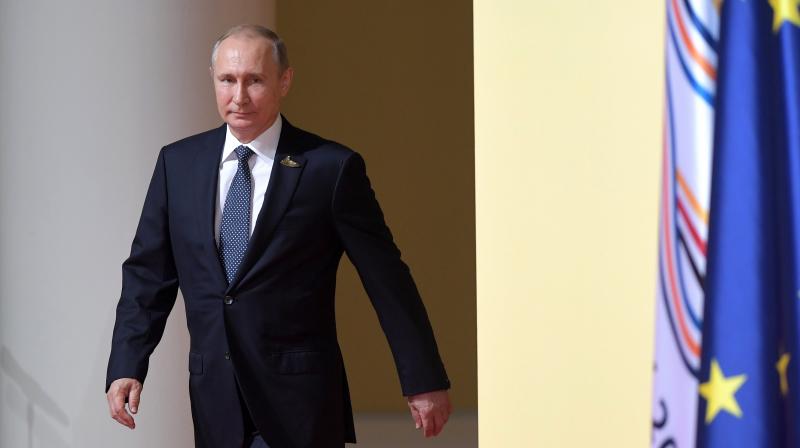Is Putin the new Stalin? Campaign begins for Russia's presidential elections
Putin's top critic Alexei Navalny, 41, has been barred from putting his name on the ballot because of a criminal conviction.

Moscow: Campaigning officially started on Monday for Russia's presidential election in March, in which President Vladimir Putin is widely expected to win a fourth term that would keep him in power until 2024.
Russian government newspaper Rossiyskaya Gazeta published a resolution adopted by the upper house of parliament, the Federation Council, scheduling the election for March 18.
Lawmakers had voted earlier to change the date of the March vote so that it will mark the fourth anniversary of the signing of a treaty formally annexing Ukraine's Crimea peninsula.
The treaty came two days after a controversial referendum deemed illegal by the West.
Putin, who was first elected to the presidency in 2000, is widely expected to sail to victory, cementing his status as Russia's longest-serving ruler since dictator Joseph Stalin.
Putin's top critic Alexei Navalny, 41, has been barred from putting his name on the ballot because of a criminal conviction, which he says is politically motivated.
Navalny, who has been campaigning in far-flung Russian regions over the past year, published a new appeal Monday, indicating he was not planning to give up. He said he needed a group of at least 500 people who would put forward his candidacy and he would try to organise 20 meetings in 20 cities across Russia to that end.
“Our campaign is nationwide and we thought it was right for the candidacy to be launched not only in Moscow,” Navalny, whose name Putin refuses to say publicly, wrote on his blog.
“Putin, his electoral commission and his courts will try to tell us that white is black. They will try to convince us that an election in which the only candidate leading a campaign that has real support cannot take part is normal,” he said, calling on supporters “not to accept this for a second.”
He has threatened to call for a boycott of the elections if he is not allowed to take part.
Funds to 'cheat you'
The head of Russia's Central Election Commission, Ella Pamfilova, said she was ready to hold the vote "at the right level".
"We will control (the election) during all the stages," she said at a news conference, adding that the commission had been allocated more than USD 298 million for the presidential vote.
Formerly a human rights ombudsman, Pamfilova was appointed the country's top election chief in March 2016 to replace the scandal-tainted official who oversaw the 2011 parliamentary election, which prompted mass protests over claims of vote rigging, the biggest challenge to Putin in his 18 years in power.
During the September 2016 parliamentary vote, the opposition accused Pamfilova of ignoring violations even when they were caught on camera.
Writing on Twitter, Navalny, whose name Putin refuses to say publicly, told Russians the funds would be spent "to cheat you".
Navalny, who has been campaigning in far-flung Russian regions over the past year, has called on his supporters to take part in a protest on Sunday "for free elections".
Putin will run against a motley crew of opposition candidates, though even the Kremlin has acknowledged that none of them stand a chance against Putin.
"There are other candidates but Putin, of course, has the most chances," his spokesman Dmitry Peskov said in December.
"The level of support from the people that he has is inaccessible to other candidates." One of the potential candidates is Ksenia Sobchak, a former socialite turned liberal TV presenter.
But many people suspect that she is running as a Kremlin "spoiler" candidate to split the opposition while bolstering interest in the election.
Gennady Zyuganov and Vladimir Zhirinovsky, respectively the longtime leaders of Russia's Communist Party and ultraconservative LDPR, who are tolerated by the Kremlin and sit in parliament's lower house, the State Duma, have both indicated a desire to run.
Last week, Pamfilova said that 23 people had expressed their wish to run for the presidency, and that the number of candidates could grow.
But analysts say that with the result of the election a foregone conclusion, turnout could be low.
According to a study released last week by Levada, an independent pollster, 58 per cent of Russians said they would vote in March, down from 75 per cent in December 2007.
During his annual year-end news conference last week, Putin said he would stand for election as an independent candidate rather than with the backing of the ruling party, United Russia.

